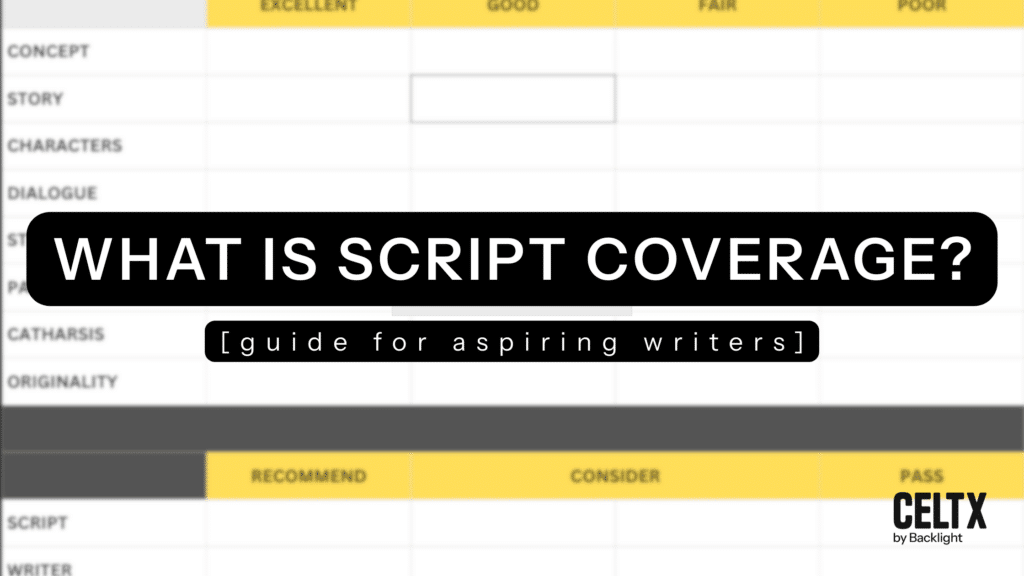
Breaking into the film industry in 2026 means navigating a genuine “spec script renaissance”. Major deals reached an eight-year high in August 2025. In this competitive market, your screenplay needs more than just a great hook. It needs professional validation. Script coverage is that critical industry filter. It acts as a professional report that dissects your story’s creative merit and commercial potential. This analysis helps producers and agents find “undeniable pages” in a sea of submissions. Think of it as a roadmap that transforms your draft into a production-ready asset. It identifies exactly where your characters pop and where your structure needs surgical precision.
This guide provides the professional blueprint you need to understand the anatomy of coverage. You will learn how it impacts your career trajectory and how to use it as a strategic investment to move your story from script to screen.
Ready? Let’s dive in!
Table of Contents
- What is Script Coverage and Why Does it Matter for Your Screenplay?
- Who Writes Professional Script Coverage Reports?
- The 6 Essential Elements of a Script Coverage Report
- Why Getting Script Coverage is a Non-Negotiable Step for Aspiring Writers
- Treating Script Coverage as a Strategic Investment in Your Career
- How to Handle Feedback & Turn Coverage Notes into an Actionable Rewrite
- Frequently Asked Questions (FAQ)
- Conclusion
What is Script Coverage and Why Does it Matter for Your Screenplay?
Script coverage is a fundamental process in the world of scriptwriting and film production. It involves a meticulous analysis and a detailed written report of a screenplay, conducted by a professional reader, Script Analyst or Script Doctor as they are sometimes referred to. This in-depth examination encompasses a wide range of crucial elements within the script offering thoughts and possible improvements that could enhance your work.
Comprehensive Evaluation
A script coverage report delves into the script’s overarching narrative, and the depth of character development. Coverage also reviews the finer details such as dialogue quality, the tone of the story, and adherence to proper screenplay format. This all-encompassing evaluation aims to provide a comprehensive understanding of the script’s strengths and areas that may require improvement.
Constructive Feedback
The primary objective of script coverage is to provide constructive feedback to the writer or producer. This feedback isn’t solely about identifying weaknesses; it also highlights the script’s strengths. By acknowledging what works well and what needs enhancement, coverage guides the subsequent rewriting and refining processes. It’s a valuable compass that helps writers navigate their way towards a polished, market-ready script.
Essential for Script Development
In the highly competitive world of filmmaking, high-quality script coverage plays a pivotal role in script development. It acts as a critical bridge between the initial draft and the final, production-ready script. Writers and producers rely on this feedback to bridge the gap between a concept and a ready to shoot screenplay.

Everything your script needs — all in one place.
Sign up for Celtx today (it’s free!)
Who Writes Professional Script Coverage Reports?
Professional coverage is produced by a specialized group of story analysts known as script readers. come from diverse backgrounds and could be aspiring writers, budding producers, or development executives on the cusp of making their mark in the industry.
Readers are often found working within production companies, talent agencies, management firms, or offering their freelance services to both emerging and established screenwriters.
It’s important to research your reader or service to find out whether they’re the right fit for you and your work, so do your homework!
What sets the best script readers apart is their ability to provide comprehensive coverage, informed not only by their analytical skills but also by their own experiences in screenplay development and writing. These individuals offer a unique viewpoint as they can step into the shoes of a fellow writer, understanding the challenges, aspirations, and intricacies of the creative process.
The 6 Essential Elements of a Script Coverage Report
Script coverage reports serve as comprehensive assessments of a screenplay’s potential, and while the format may exhibit some variation, they generally consist of several key sections:
1. Logline
At the outset, coverage typically features a succinct logline, a concise one-to-two sentence summary of a story that captures its core concept, main character, central conflict, and stakes. This may be your existing logline or one the reader has created based on their analysis of your story. This distilled snapshot encapsulates the script’s fundamental premise, providing a quick peek into the story’s core.
2. Summary
The summary section offers a compact plot rundown, usually spanning 1 to 2 pages. This overview, in turn, provides readers with an essential grasp of the storyline, ensuring they’re oriented before diving into the script itself. As a result, it can be especially helpful for writers, since it highlights how a reader has interpreted the story on their own. If, however, this summary doesn’t sound right, it may indicate that the reader wasn’t the right fit for your material or that the script itself is missing key elements of clarity.
3. Analysis
The heart of the coverage report lies within the analysis section, which forms the bulk of the document. Here, the script is meticulously dissected. Every facet, from the narrative’s strengths and weaknesses to considerations regarding characters, tone, structure, and more, is explored in detail. This is where the reader provides insightful, often constructive, feedback.

4. Marketability
Within this section, the report delves into the pragmatic considerations of the script’s commercial viability. It examines how the script is likely to perform at the box office and its potential for successful sales. This assessment not only aids in budgetary decisions for producers but also identifies key audience demographics.
5. Recommendation
Here, the reader delivers a verdict on whether the script is deserving of further development. It’s a make-or-break moment for the writer so pay close attention to this section.
6. Formatting
While the primary focus of coverage revolves around dramatic elements, it doesn’t stop there. Reports also weigh in on the script’s writing style, its adherence to industry format standards, and its overall presentation. These considerations, though secondary, contribute to the script’s market readiness.
Why Getting Script Coverage is a Non-Negotiable Step for Aspiring Writers
Script coverage provides invaluable third-party feedback that is simply impossible to get on your own. Even professional writers rely heavily on coverage to improve their work.
For up-and-coming screenwriters, high-quality notes can elevate your writing to a more marketable level. Coverage helps identify blind spots and weaknesses that may be holding your script back. Implementing even a portion of the feedback can vastly improve your draft.
Just as importantly, coverage gives you an industry professional’s perspective on the concept and execution. This can help asses if your script has commercial prospects. With the odds of selling a spec script being astronomically low, coverage helps maximize your chances by ensuring you put your best work forward.

Treating Script Coverage as a Strategic Investment in Your Career
Every screenwriter knows it takes more than talent alone to break into the industry. This is where seeking out high-quality script coverage becomes an essential investment in your long-term writing career.
Getting insightful notes from an experienced reader provides invaluable perspective on your work. Even if you disagree with some notes, the majority should pinpoint areas needing improvement. You could even seek out multiple sources for coverage to cross reference the notes and further refine what to resolve and what to leave. Ultimately screenwriting is very subjective and you may find it better to get a balanced opinion by seeking 2-3 rounds of feedback per draft.
Implementing feedback through rewrites and polishing objectively elevates your work. You come away with a stronger, tighter, more compelling script.
The validation of positive coverage also provides a tremendous confidence boost. Some writers will post their feedback online to show interest in their script and help bring more visibility to their project and their work.
Beyond the script itself, coverage gives you a masterclass in dramatic writing from an insider’s perspective. You learn stronger storytelling techniques to apply across all your projects. It exposes you to current market trends and how professional readers evaluate scripts.
Aim to work with readers who are also writers themselves. Their notes come from a place of understanding the craft on a deeper level. Don’t just implement the feedback word for word. But let quality coverage guide you in honing your unique voice.
Just like classes and mentors, investing in coverage advances your skills to the next level. Treat it as part of your long-term career investment by budgeting accordingly. It’s an investment that pays exponential dividends down the road. One that can truly help elevate your writing to a more professional and marketable level.
How to Handle Feedback & Turn Coverage Notes into an Actionable Rewrite
Receiving feedback on your creative work can be a nerve-wracking experience. While objective notes on issues like structure and formatting are straightforward, subjective critiques on style, voice, and other “intangibles” can be much harder to process. As a writer, how should you handle highly subjective feedback?
Here are some tips:
- Recognize opinions versus issues
Feedback highlighting clear issues with plot, character, or pacing is useful. But reactions like “I just didn’t love the voice” are purely subjective opinions. Learning to separate opinions from substantive issues provides valuable perspective.
- Consider the source
Weigh feedback more heavily from readers with experience in your specific genre and style. Notes from a romance expert may not resonate the same for a sci-fi script.
- Don’t take it personally
Subjective feedback reflects the reader’s personal taste and sensibilities. It’s not a reflection on your skills or the quality of the writing. The most experienced writers get contradictory subjective notes all the time.
- Look for common themes
If multiple readers highlight the same subjective issues, pay special attention even if you disagree. Figure out what’s not landing with audiences about certain choices.
- Identify your champions
While some feedback won’t work for you, identify notes aligning with your creative vision. Use those readers who connect with your style as a compass going forward.
- Revise strategically
Only implement subjective feedback that makes the work stronger according to your creative instincts. Don’t overwrite just to please one person’s opinion
- Test with target audiences
Getting reactions from sample readers in your target demographic can clarify if widely shared opinions should guide revisions or not.
- Stick to your guns when needed
If feedback wants you to radically change your vision or voice, be open to tweaks but don’t lose sight of your original intent.
Handling subjective critiques is all about balance. Be open, implement suggestions strategically, but stay true to your creative identity. This allows you to improve the work without compromising your style and voice.
Ready to get your script coverage? Check out The Ultimate Guide to the Best Script Coverage Services to learn more about some of the best options available.
Frequently Asked Questions (FAQ)
Script coverage is a professional analytical report used to evaluate a screenplay’s creative merit and commercial potential. Producers, agents, and executives use these reports as a primary tool to decide which projects warrant representation or financial investment.
The industry relies on three standard ratings: Pass, Consider, and Recommend. A “Pass” indicates the project is not currently ready for production. A “Consider” means the script shows high potential or the writer is particularly talented. The “Recommend” rating is a rare gem reserved for the top 1% of production-ready material.
Coverage is a brief 2-to-4-page “checkup” designed for industry professionals to quickly filter through submissions. In contrast, script notes are 10-to-15-page “MRIs” that offer in-depth, line-by-line feedback specifically to help a writer master their revisions.
A standard report includes a one-sentence logline, a detailed one-page synopsis, and a rating grid for core story elements. It concludes with analytical comments where the reader identifies specific strengths and weaknesses regarding character, structure, and marketability.
The 2026 marketplace is currently seeing a renaissance of original storytelling, with spec script deals reaching an 8-year high. Professional coverage acts as a vital “advocacy document,” helping busy decision-makers discover undeniable stories in a sea of submissions.
Conclusion
Getting quality script coverage is one of the smartest investments any aspiring writer can make. Though it requires financial expenditure, the feedback you receive is often priceless.
Use coverage as your compass to elevate your writing to a more professional level. Let it guide you in telling tighter, stronger, more compelling stories.
Approach the notes with an open mind, implement feedback strategically, but stay true to your creative vision.
With coverage as part of your long-term career strategy, you give yourself the best possible chance to break through in this extremely competitive industry. Stay determined in developing your skills and your voice. With hard work and persistence, coverage can provide that extra push needed to get your screenplay out of the drawer and onto the screen.
Focus on your story, not your formatting.
Let Celtx’s Script Editor automatically apply all industry rules while you focus on the story.
Up Next:

Script Revision Colors: How to Track Changes in Production
Coverage leads to rewrites — and rewrites lead to new drafts. Learn what script revision colors mean, when to use them, and how professionals manage changes as a script evolves.
